The Snowbird Life Trade-Offs
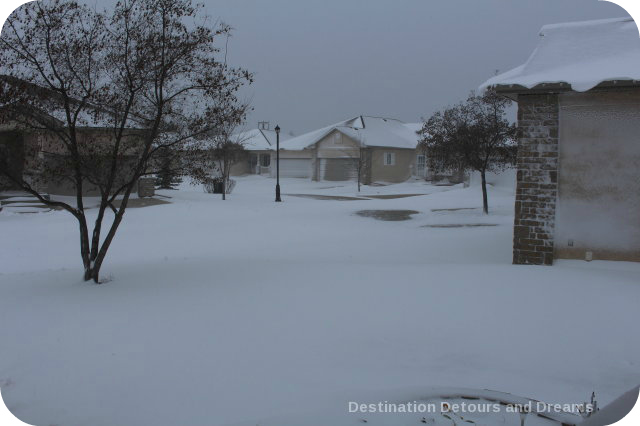
A winter at home provides insights into what snowbirds give up and leave behind
If this winter had been another snowbird winter for my husband and me, now is the time we would be returning home after several months spent in a warmer location. But this was not another snowbird winter. Except for almost three weeks at the end of March/beginning of April in Victoria, British Columbia, we spent the entire winter at home in Manitoba. And by staying home, I gained further insights into the snowbird life.
Snowbird definition: someone from a northern climate who moves to a more southern, warmer location for the winter.
After four winters away, I had new eyes and a new perspective on my Winnipeg winter. I now have a deeper appreciation for the trade-offs snowbirds make. (These trade-offs for the most part also apply to any kind of long-term travel.)
At Home Or Away From Home
Even after the most wonderful of trips, coming home can bring a feeling of relief and relaxation. There is comfort and solace being in your own home. Snowbirds who own their winter home may have this feeling in both locations. Many snowbirds, like my husband and me, are renters. Many return to the same rental year after year and it becomes a home away from home. Although we returned only once to the same house, all the places we stayed felt like a home away from home. But there were still not quite home. They were decorated to someone else’s taste and supplied and organized as someone else saw fit. Snowbirds who own their winter homes can create a space which more truly feels like home. With that, however, comes the responsibility and work of maintaining a second home.
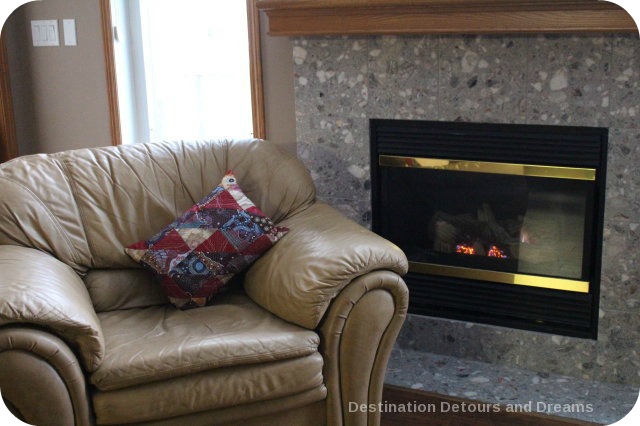
Being away for the winter means home maintenance and clean-up activities get squeezed into summer months or neglected. This winter, I organized the storage area in our basement and re-organized a few other cupboards, tasks which might have lingered into next year if I had been away for the winter.
Considerations for potential snowbirds:
Think about how long you will be comfortable living in a space other than your own home when deciding the length of your snowbird winter. Do you need to own your own space (even if it is a small recreational vehicle)? What demands does your permanent home make on your time in terms of maintenance? If maintenance work is too much to squeeze into the summer months, can you afford to hire someone to do the work? Be open to the ways things may be organized in a winter rental home. If you are there for several months and something isn’t working well, is it something you can rearrange? It is easy to switch dishes from one cupboard to another. On the other hand, you may discover something in the arrangement which makes a lot of sense and you may want to do some re-organizing of your permanent home when you return.
Routine
It is exciting to do new and different things, but it can also become exhausting after a while. Routine is grounding and stabilizing. Most snowbirds develop a routine of sorts during the winter. It might include more “adventures” or leisure activities than their routine at home, but a large part of their lives follows routine. My life, even at home, is less of a routine than when I was reporting to an office for work every day. Still, my time at home this winter has felt more than “real, regular life” than my snowbird winters. (And yes, there is both good and bad in that.)
This winter I wrote. I developed a semi-regular schedule for yoga and tai chi classes. I was around to serve on an ad-hoc committee for my church. I started a couple of projects I’ve been meaning to get to for a couple of years. I haven’t finished them, but at least I’ve started. I took Spanish classes offered through the school division’s continuing education program. Continuing education classes are offered in fall, winter, and spring. I’ve been unable to even consider a class in the previous four years. Our departure dates fell in the middle of the fall session. We were away for the winter session. Spring session started before we returned. All in all, there has been a normal, regular rhythm to my life this winter.
Considerations for potential snowbirds:
Think about how much routine and “ordinary living” you want to build into your winter. If you are away for less than two months, you may seek a series of adventures and unstructured time. Longer periods away may require more routine. If you participate in regular activities which are important to you (e.g. a particular sport, volunteering, church involvement, hobbies), find places to participate in these activities in your snowbird location. Or try a new activity in your snowbird location. Maybe a community organization or your snowbird community offers a course on something you’ve always wanted to learn. Accept that you will forego the winter activities you typically participate in at home.
Community Connection
Each spring when we returned to Manitoba, along with a sense of the familiar there was a bit of strangeness. Things felt different. After staying home for a winter I’ve begun to appreciate how the time away weakened the feeling of connection with my city. I kept up with the major news and happenings through the Internet and through contact with friends. But I didn’t feel the day-to-day pulse of the city.
This winter I’ve read the newspaper daily (even if some days I skimmed lightly) and listened to local radio. I’ve read about the “smaller” things happening in the city – the things not newsworthy enough to ripple across the miles, but which are important in shaping the fabric of a city. I’ve heard people’s reactions to what is and isn’t happening.
Winnipeg has a thriving arts community. The season for most theatre, symphony and dance programs is through fall and winter. This winter, I attended a few plays, something I haven’t done in Winnipeg for several years. I ran into people I knew in the lobby. I took in some other art and special events. I was once again a part of the city.
Considerations for future snowbirds:
Be prepared to look at your home town with different eyes when you return and to perhaps feel a small disconnect from it. If it is important to you to stay connected, arrange to access local news online through reading newspaper articles or streaming television or radio. Take opportunities to learn more about the community you are wintering in and develop a connection with that place.
Connection With Family and Friends
I think that for most people the biggest concern about being away from home for a length of time, be it a snowbird winter or some other travel, is being away from family and friends. With the Internet, social media and phone service, staying connected has never been easier. During my snowbird winters, I knew what was happening with many of my friends and family members through social media statuses and conversations. I chatted with some on the phone. We had Skype and FaceTime conversations and exchanged emails. I e-chatted late at night with a sleepless aunt.
And yet, it is not quite the same as being in close physical proximity. A friend dropping by for coffee Making impromptu decisions to go somewhere together. Running into friends at the store. Attending family get-togethers. Regular contact which includes the daily minutiae of life. I don’t have grandchildren, but those who do and see them regularly are privy to the changes which happen so quickly in young children as they grow. Sometimes, quantity of time is as important as quality of time.
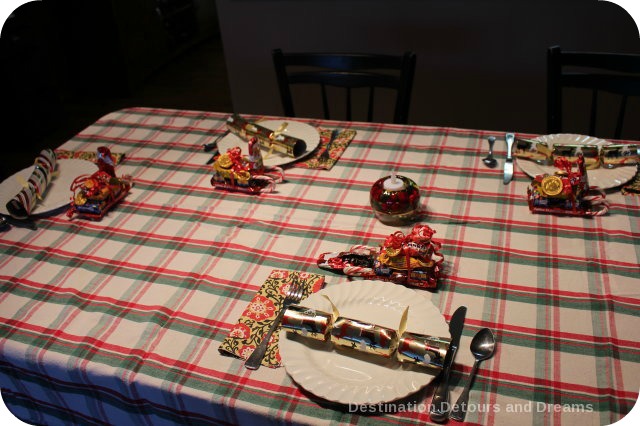
When we returned from snowbird winters and I rejoined groups (e.g. book club, reading group), I sometimes felt unintentionally excluded from conversations which continued on a thread started in a previous meeting I’d missed. This winter I attended writing group and book club more regularly. I’d joined the book club shortly before our first snowbird winter. A friend had been a member for years. I’d met another member a couple of times, but knew no one else in the group. As the group doesn’t meet in summer months and I was away for most of the winter, I missed more meetings than I attended. Attending more regularly this winter has allowed me to get to know these wonderful ladies better.
When you are away for the winter, you are largely unable to help family and friends with the big and small crises in their lives. You are not able to spend time with ailing loved ones. I am glad that fate landed me in Winnipeg this winter because I was able to spend time with my brother before he passed away. It was difficult at times to see how cognitive issues had taken away the brother I knew, but I am still glad to have had the time together.
Considerations for potential snowbirds:
Establish mechanisms for staying in touch with family and friends in ways which work for you. Use FaceTime of Skype to talk with and see your grandchildren. Consider flying home to attend important family events. Understand that some winters the right choice may be to shorten the time away or forego it altogether to be with family members or friends in crisis. And don’t forget to make new friends in your winter location.
Weather
Cold weather is the primary reason snowbirds migrate south. In the bitterest cold of this winter, I wished I was somewhere hot. But I also realized how beautiful winter can be. Snow-covered fir trees, lacy ice designs on windows, fluffy snowflakes. I attended Winnipeg’s annual winter festival, Festival du Voyageur, for the first time in years.
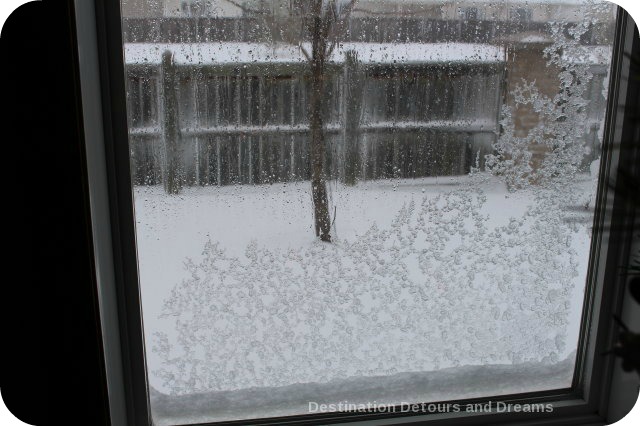
The winter turned out easier to deal with than I expected. We had lots of snow early on, but in the housing complex where we live the snow shovelling is done for us. There were the pluses of the joys of “regular life”, being at home, and reconnecting with my city, friends, and family. February was one of the mildest on record. Even still, come mid-March I was sooo tired of bundling up every time I went out.
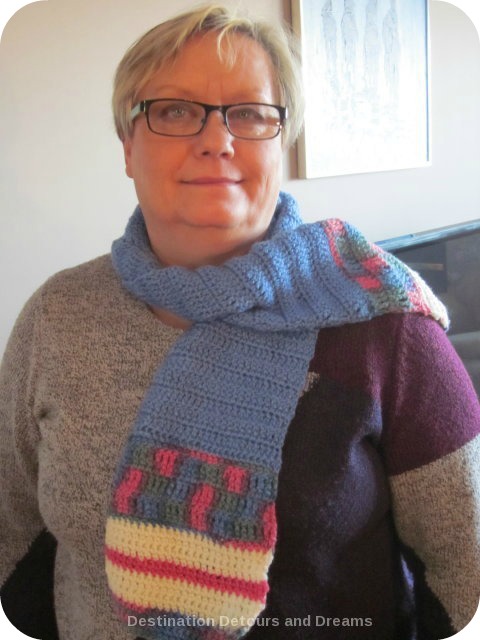
Summary
Staying home for the winter has reminded me of the joys of being there. Does it mean I will no longer go away for the winter? Definitely not. We are already discussing what we might do next winter. In addition to leaving the cold behind, I look forward to exploring other parts of the world. But I am also aware of what I leave behind. And reminded, once again, that there is much to appreciate where ever you are.
If you enjoyed this post, sign up for Destinations Detours and Dreams monthly e-newsletter. Get behind the scenes information and sneak peeks ahead in addition to a recap of the month’s posts.
PIN IT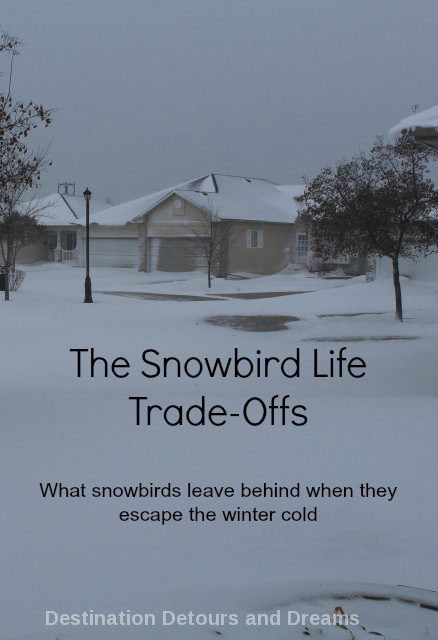

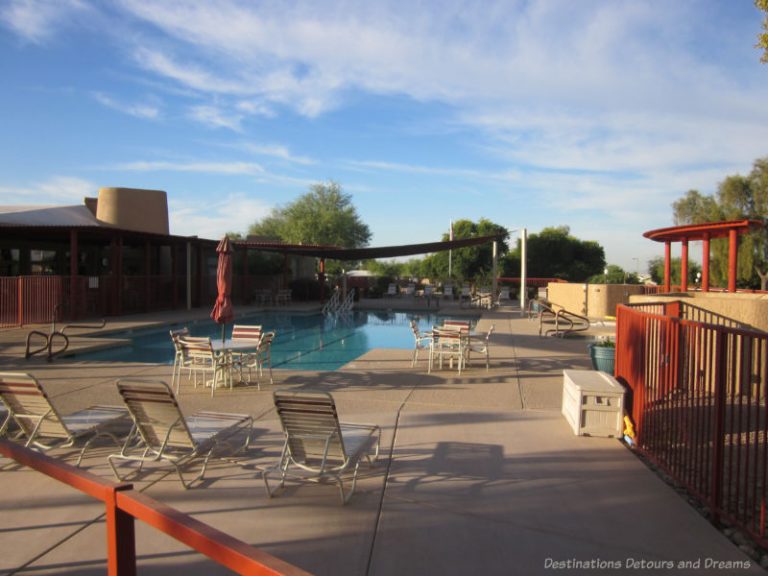
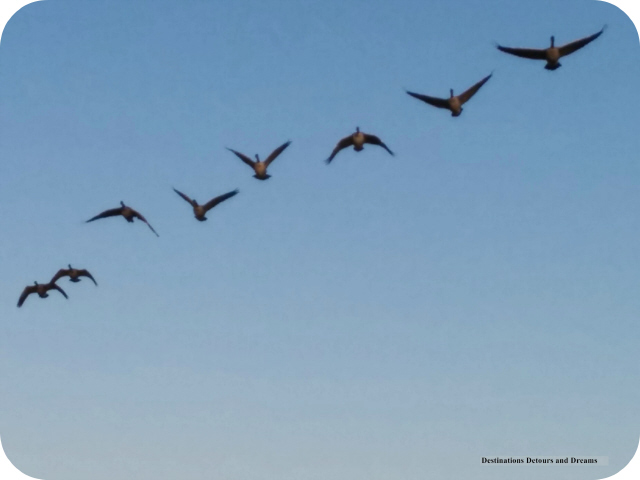
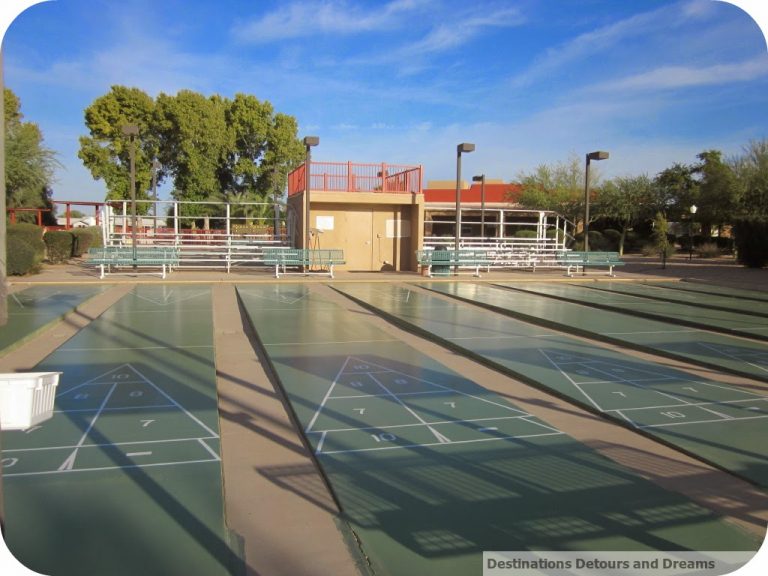
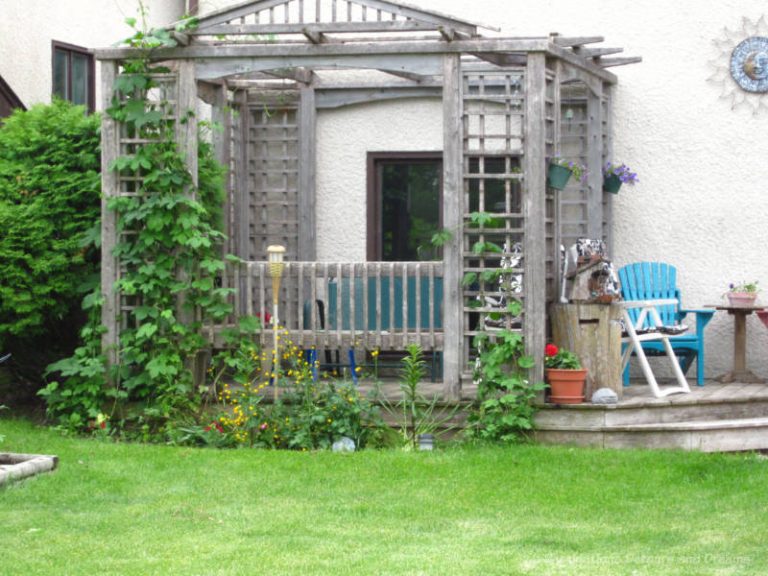
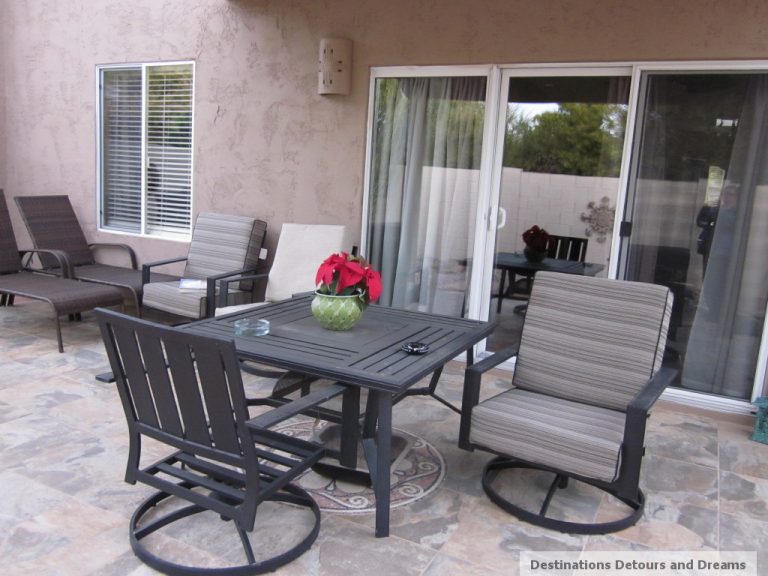

A very thoughtful look at snowbirding (if there is such a word). Although retired, I’ve never done it. For one thing, I had a child late in life so he is still in middle school. But I also like the seasons, even winter.
Ken, there is something to be said about experiencing all the seasons. Then again, the joy of winter can wear thin after months of bitter cold.
I’m definitely looking forward to being a snowbird again. I did that when I was in my early twenties and worked in the Everglades during the cold northern months. This winter was Boise’s snowiest winter on record. It was pretty brutal, especially considering the area tends to have cold, but relatively snowless winters. Having grown up in North Idaho, I’ve had my share of snowy winters, but as a non-skier and general hater of the cold, I don’t miss it much. I also loved living in NC for a couple of years and having it be 70 degrees on Thanksgiving 🙂
Jeri, when you’re a snowbird again maybe we’ll wind up in the same place some winter and can actually meet in person.
I’ve lived in warm climates for a long time. Our locations are/were destinations for most people, including snowbirds. Regardless, I found your post interesting and informative.
Thanks Susan.
Excellent points about dividing your time between two places. Sounds like you filled those cold winter months with the warmth of friends and kept yourselves super busy! We’ve reached the age where we are thankful for each day – no matter where we spend it and with whom. Happy belated Easter, Donna.
Happy belated Easter to you too, Jackie. Each place and time in our lives bring something to appreciate.
Well balanced thoughts, Donna. I’ve never had the pleasure of being a snowbird and escaping winter entirely, but have always gone away during the winter from one to six week and loved every minute of my time away from the one and snow.
Thanks Doreen. Getting away from the cold, even for one week, often makes it easier to get through and enjoy the rest of winter.
Loved reading your reflections on what makes a *home* as well as the trade-offs of a snowbird lifestyle. Living on Padre Island off the coast of Texas for many years, we met many snowbirds from the northern climes and, during our years as nomads, made friends with lots of Canadians in Mexico, South & Central America. Staying home and enjoying comfortable and well-loved routines, maintaining and strengthening bonds with friends and family as well as enjoying well-loved hobbies makes a wonderful life. However, from reading your past posts, I know you enjoy stepping out of the routine too. It’s fun to change up lifestyles, explore new places and then return to your nest and the familiar. There’s much to appreciate about both ways to live! Anita
Anita, you’re right, I do enjoy stepping out of routine at times. But also like quiet comfort to rejuvenate. There is much to appreciate in different styles of life. People need to know what they’re most comfortable with to live life their way (and maybe step out of the comfort zone every once in a while).
Thanks for the thoughtful post Donna…you make some very good points about the advantages and pleasures of staying home. I know I definitely miss my exercise routine when travelling and it take a few weeks to reestablish myself when I get to Mexico each year. But overall, I find it easier to get healthy in a warmer climate as I eat lighter foods and walk outdoors more often. However with aging parents and a brood of grandchildren, its tough to be away for a long period of time and places a burden on the rest of the family. So I’ve been trying to spend more time home than away.
Michele, it can be a balancing act. It sounds as if you are finding the balance which works for you right now.
What a great post about whether to snowbird or not. I shared this with my husband. Not sure he’ll take up crochet (I so wish! Great scarf!), but I think he’ll enjoy the pros and cons as you so thoroughly laid them out. Thanks!
RoseMary, everyone has to decide for themselves what they’re willing to trade off. By the way, my husband has been crocheting up a storm this winter.
Loved this post! There’s no Utopia. You aptly point out that there are always tradeoffs!
Thanks Irene. Definitely tradeoffs. There are pluses and minuses to each place and each lifestyle choice.
Loved this post Donna, as we are right in the middle of the snowbird transition and will be renters also. Your considerations were spot on for all of the discussions we’ve been having and you had great insight as to all the trade offs. Not sure how it will end up, but have to say I am impressed with your hubby’s crochet skills.
Alison, it is good you are discussing these things. It will help you understand better what type of arrangements you want to make. Of course, you will also learn through the snowbird experience itself. Although I considered many of these things before our first snowbird winter, I have a much better understanding of the trade-offs after a few snowbird winters followed by one at home. I’m sure you’ll find lots to enjoy about being a snowbird.
We moved from the west coast to the east coast 2 1/2 years ago so it’s all been a new experience for us. Last winter we traveled south for several weeks and missed a big snowfall and we were a bit sorry to have missed it. This past winter we stayed home and enjoyed the season. I think retirement makes it much easier to enjoy winter when one doesn’t “have” to go out in the bitter cold. We spent many a day just relaxing in front of a warm fire in the fireplace.
I’m glad we spent the winter at home because we’re about to head out again on new adventures and we gave ourselves really nice memories. And, we also know that when we return home again, we know this is where we want to resettle and that winter is very doable.
I loved that your husband crocheted your scarf!
Patti, I agree winter is much doable when you don’t “have” to go out on the most miserable days. But also more enjoyable when you do get out and appreciate it on other days.
I think happily snowbirding has a ling to do with community. My mom has been a snowbird for over 20 years and has a rich community of friends both down south and up north (some are friends in both places). But she’s been in the same place for most of that time, so both really are home. We spent 2 whole weeks in AZ this year (that’s a long time for us to stay in one place other than at home) and, while I liked the time away, I can see I would need to have my own place for it to really feel like home. I’d always thought I would want to spend winters in the south like my parents, but now I’m not so sure. As you so aptly point out, there are all sorts of trade-offs. I’m not sure I’m willing to spend enough time in the same place in the south to build the sort of community my mother has.Next winter will be several vacations!
Cindy, the communities people become part of during their winters is definitely a big appeal of the snowbird life. But I too am not sure at this point that I want to spend every winter in the same place.